Focus on Faculty
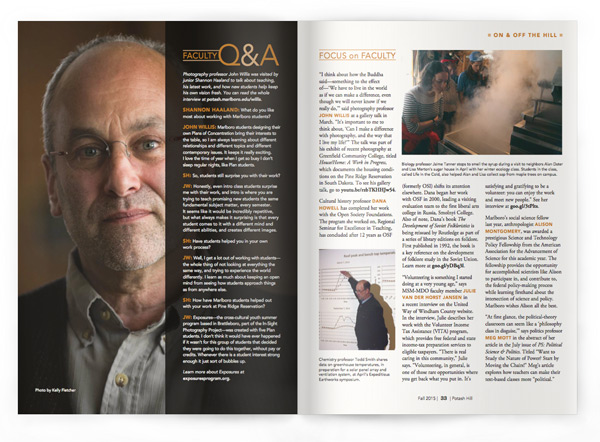
Faculty Q&A
Photography professor John Willis was visited by junior Shannon Haaland to talk about teaching, his latest work, and how new students help keep his own vision fresh. You can read the whole interview.
Shannon Haaland: What do you like most about working with Marlboro students?
John Willis: Marlboro students designing their own Plans of Concentration bring their interests to the table, so I am always learning about different relationships and different topics and different contemporary issues. It keeps it really exciting. I love the time of year when I get so busy I don’t sleep regular nights, like Plan students.
SH: So, students still surprise you with their work?
JW: Honestly, even intro class students surprise me with their work, and intro is where you are trying to teach promising new students the same fundamental subject matter, every semester. It seems like it would be incredibly repetitive, but what always makes it surprising is that every student comes to it with a different mind and different abilities, and creates different images.
SH: Have students helped you in your own work process?
JW: Well, I get a lot out of working with students— the whole thing of not looking at everything the same way, and trying to experience the world differently. I learn as much about keeping an open mind from seeing how students approach things as from anywhere else.
SH: How have Marlboro students helped out with your work at Pine Ridge Reservation?
JW: Exposures—the cross-cultural youth summer program based in Brattleboro, part of the In-Sight Photography Project—was created with five Plan students. I don’t think it would have ever happened if it wasn’t for this group of students that decided they were going to do this together, without pay or credits. Whenever there is a student interest strong enough it just sort of bubbles up.
Learn more about Exposures at exposuresprogram.org. Photo by Kelly Fletcher
Focus on Faculty
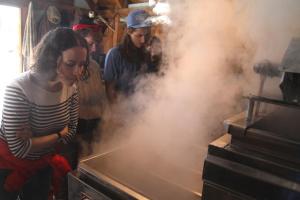
“I think about how the Buddha said—something to the effect of—‘We have to live in the world as if we can make a difference, even though we will never know if we really do,’” said photography professor John Willis at a gallery talk in March. “It’s important to me to think about, ‘Can I make a difference with photography, and the way that I live my life?’” The talk was part of his exhibit of recent photography at Greenfield Community College, titled House/Home: A Work in Progress, which documents the housing conditions on the Pine Ridge Reservation in South Dakota. See his gallery talk.
Cultural history professor Dana Howell has completed her work with the Open Society Foundations. The program she worked on, Regional Seminar for Excellence in Teaching, has concluded after 12 years as OSF (formerly OSI) shifts its attention elsewhere. Dana began her work with OSF in 2000, leading a visiting evaluation team to the first liberal arts college in Russia, Smolnyi College. Also of note, Dana’s book The Development of Soviet Folkloristics is being reissued by Routledge as part of a series of library editions on folklore. First published in 1992, the book is a key reference on the development of folklore study in the Soviet Union. Learn more.
“Volunteering is something I started doing at a very young age,” says MSM-MDO faculty member Julie van der Horst Jansen in a recent interview on the United Way of Windham County website. In the interview, Julie describes her work with the Volunteer Income Tax Assistance (VITA) program, which provides free federal and state income-tax preparation services to eligible taxpayers. “There is real caring in this community,” Julie says. “Volunteering, in general, is one of those rare opportunities where you get back what you put in. It’s satisfying and gratifying to be a volunteer: you can enjoy the work and meet new people.” See her interview.
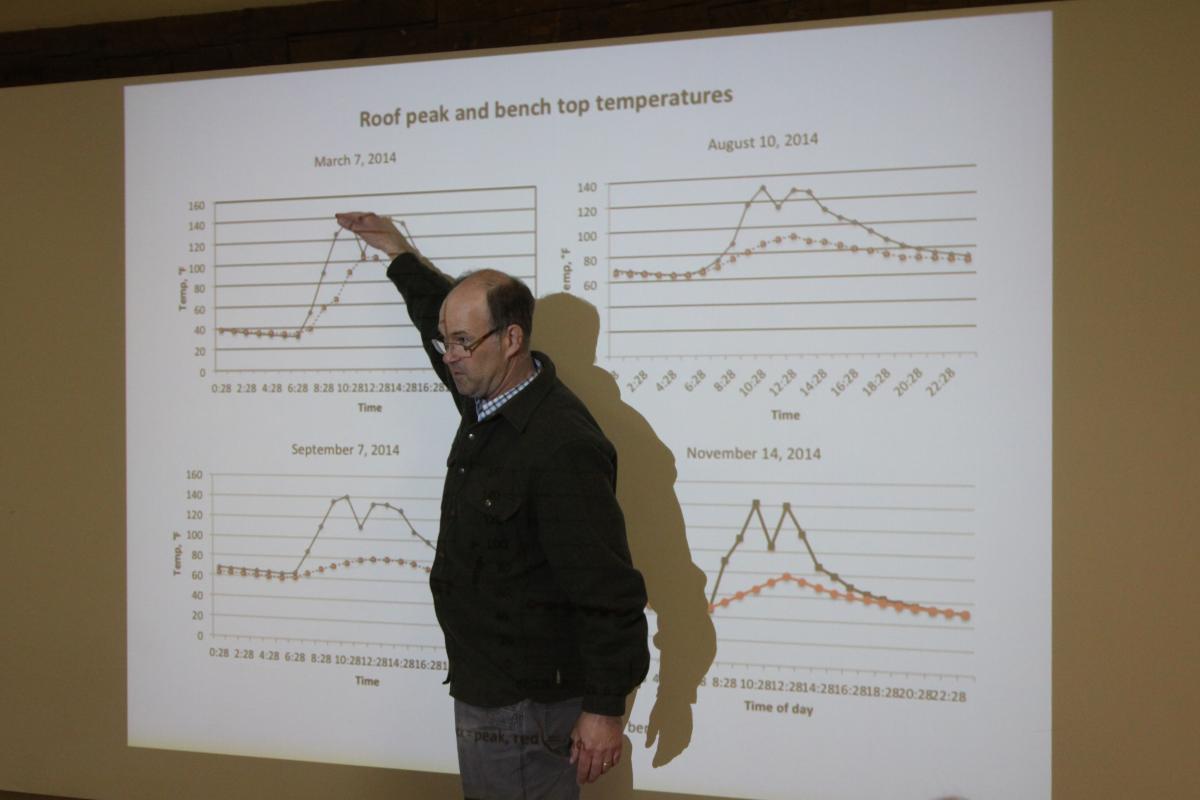
Marlboro’s social science fellow last year, anthropologist Alison Montgomery, was awarded a prestigious Science and Technology Policy Fellowship from the American Association for the Advancement of Science for this academic year. The fellowship provides the opportunity for accomplished scientists like Alison to participate in, and contribute to, the federal policy-making process while learning firsthand about the intersection of science and policy. Marlboro wishes Alison all the best.
“At first glance, the political-theory classroom can seem like a ‘philosophy class in disguise,’” says politics professor Meg Mott in the abstract of her article in the July issue of PS: Political Science & Politics. Titled “Want to Study the Nature of Power? Start by Moving the Chairs!” Meg’s article explores how teachers can make their text-based classes more “political.” She considers how different teaching formats enact different types of power in the classroom, in turn necessitating political judgments. “By physicalizing the argumentative, introspective, and descriptive devices that writers of political theory use, students become better readers of these often old and usually dense texts,” says Meg. Read more.
In March, Chelsea Green Publishing released The Social Profit Handbook, by David Grant, faculty member in the Center for New Leadership’s Board Leadership Institute and Certificate in Nonprofit Management programs. The book offers those who lead, govern, and support mission-driven organizations and businesses new ways to assess their impact in order to improve future work, rather than merely judge past performance. Assessment doesn’t have to mean piles of quantitative data, says David, the former president and CEO of the Geraldine R. Dodge Foundation. “If you can describe it in words, you can measure it.”
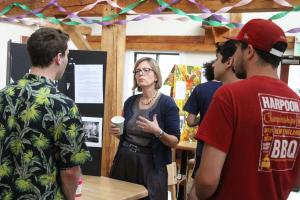
“Marlboro College music professor Stan Charkey has written a new work, and it’s one that poignantly brings to life quiet moments from Vermont’s history,” writes Kari Anderson, managing producer for VPR Classical. Stan was interviewed by VPR in April regarding Vermont Headstones, his cycle of 12 songs for baritone, oboe, and viola that uses poetic inscriptions from historic Vermont cemeteries for the lyrics. The piece had its world premiere at Marlboro College last November, to glowing reviews. In April, Stan joined Kari to talk about what inspired Vermont Headstones, and the previously unsung Vermonters whose stories became songs. Read more.
“Vermont education pioneer John Dewey called for the ‘full participation with all our powers in the endeavor to wrest from each situation its own full meaning,’” says film and video studies professor Jay Craven. An award-winning independent filmmaker, co-founder of Kingdom County Productions, and director of the Movies from Marlboro semester intensive, Jay was invited to be the commencement speaker at Burlington College last May. He was also awarded an honorary degree in recognition of his contributions to the local and broader artistic communities. “Jay has opened the world of the arts and film to the citizens of the Kingdom and beyond,” says Burlington College President Carol Moore.
In May, visual arts faculty Cathy Osman and Tim Segar were featured in a group show at the Oxbow Gallery, in Northampton, Massachusetts. Titled Synecdoche: Simultaneous Understanding, the show included the work of eight Oxbow artists, and was curated by Deborra Stewart-Pettengill. For those unfamiliar with the term, synecdoche is a figure of speech similar to metonymy, in which a part is made to represent the whole, or vice versa. The Oxbow Gallery is a collective gallery owned and operated by 35 artist-members, showcasing a variety of fine art techniques and mediums.
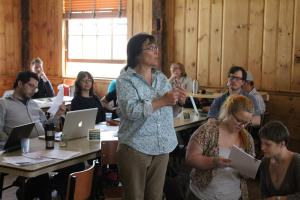
And the winner is…Jim, Tim, and Todd. Computer science professor Jim Mahoney, visual arts professor Tim Segar, and chemistry professor Todd Smith were the proud winners of a LulzBot Mini v1.0 3D printer, as part of the first annual LulzBot Education Giveway sponsored by parent company Aleph Objects. The printer, which turns plastic filaments into three-dimensional shapes based on computer-aided designs, can be used by students in all areas of study. “We are excited to house the 3D printer in the new Snyder Center for the Visual Arts, which is intended for cross-disciplinary interaction,” said Todd. Kudos to campus store manager Rebecca Bartlett ’79 for alerting faculty to the competition.
“I cannot account for my mother. She is too many,” writes the inimitable literature and writing professor John Sheehy, who published a nonfiction story in the July/August issue of the online literary magazine Eclectica (Vol. 19, No. 3). Titled “To Thee Do WeCry,” John’s story reflects on the life and relationships of his mother, Rita, on the occasion of her funeral. John has previously published nonfiction in Fourth Genre, and had a story in the book The Good Men Project. Read his story.
In May, Karen White’s book Practical Project Management for Agile Nonprofits was awarded the bronze award for nonprofit books in the eighth annual Axiom Business Book Awards. Karen is a faculty member in the MSMMDO program and program chair for both the MSM in Health Care Management and MSM in Project Management programs. Karen’s second book, Practical Project Management offers useful approaches and templates for project managers to best maximize limited resources. “According to our publisher, it went up against books from some major publishing houses and was very well received for its practicality and applicability,” says Karen.
Last fall, Potash Hill reported that visual arts faculty members Cathy Osman, Tim Segar, and John Willis were launching a website and other efforts to support the Khmer Children’s Education Organization (KCEO), a family-run school in rural Cambodia. This year KCEO has been recognized with a commitment for ongoing assistance from the World Vision Organization, but they still need to raise their own percentage of the budget to receive this assistance. Cathy, Tim, John, and John’s wife, Pauline Brett, are on the school’s advisory board, and are encouraging other community members to help: even small donations can make a substantial difference. Learn more and contribute at khmerchildren.org.
In May, theater professors Jean O’Hara and Brenda Foley and junior Rainbow Stakiwicz participated in a weeklong residency with Spiderwoman Theater, the oldest Native women’s theater ensemble in North America. Based at the University of Oregon, the week of Indigenous-centered theater-making built upon Jean’s previous close collaborations with host Theresa May and Muriel Miguel, artistic director of Spiderwoman Theater. The residency showcased Indigenous theater as a medium to address Native communities’ relationship to rivers, while highlighting traditional environmental knowledge and understandings of sexuality and gender. In July, Jean collaborated again with Muriel Miguel on a Native theater intensive sponsored by the Centre for Indigenous Theatre.
Breaking out of unemployment and into a restaurant job in Brattleboro got easier this year, thanks to Tristan Toleno, faculty member in the MBA and MSM-MDO programs. Tristan was the resident chef for the “Farm to Plate” Culinary Apprenticeship Program, a 12-week program designed to lead to permanent food preparation positions and sponsored by the Strolling of the Heifers. The program offered its 12 participants basic food preparation skills from knife safety to culinary mathematics, management skills, job readiness skills, and on-the-job training in local restaurants and institutional kitchens. It was free to participants who met income and employment status qualifications, including veterans.
